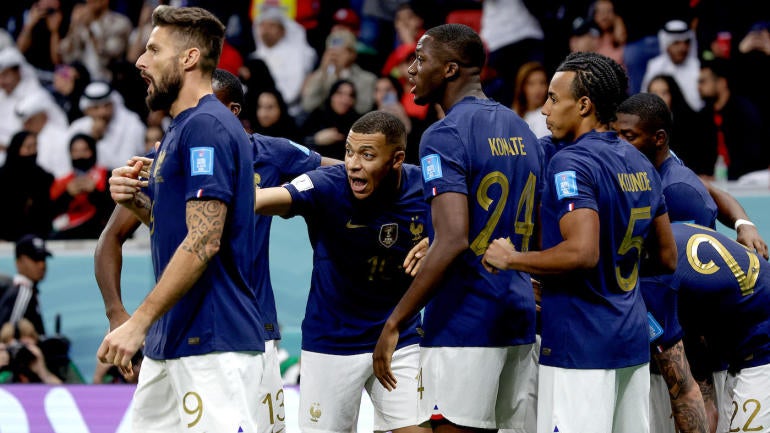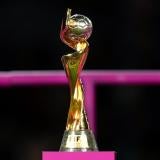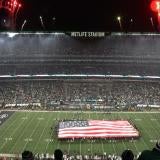
France are into their second consecutive FIFA World Cup final and will do battle with Argentina on Sunday to potentially become just the third nation to defend a men's title. Back-to-back finals are one thing, but Les Bleus have actually now reached four of the last seven -- an impressive feat considering that this current run started back in 1998 on home soil with captain Didier Deschamps lifting the trophy.
The French are faring at least twice better than any other country so far in the 21st century and their talent and strength in depth suggests that they could be about to tap into their dynastic potential for the foreseeable future. Potentially heading into the UEFA 2024 Euro with a third star on their jerseys above their crest is a very real possibility unless Lionel Messi and Qatar's overriding narrative of the legendary Argentine's final World Cup can stop them in Lusail.
So, how have France done it four years apart? Deschamps and his squad's latest feat is a success story which illustrates the incredible strength of domestic youth development and the French Football Federation's mastery of the naturalization process to ensure that no stone goes unturned in the search for the very best talents.
Craving more World Cup coverage? Listen below and follow House of Champions, a daily CBS Sports soccer podcast, bringing you top-notch analysis, commentary, picks and more during the big games in Qatar.
Of the current 25-man squad, 26 if you count the fact that France-born and raised Ballon d'Or winner Karim Benzema is technically still part of the player list because Deschamps did not replace him, only four players broke through outside of French borders. Star man Antoine Griezmann, brothers Theo and Lucas Hernandez and Dayot Upamecano are all France-born but debuted professionally abroad.
Griezmann hails from Macon but surfaced across the French border with Real Sociedad in Spain's Basque Country region which extends into and influences parts of France because of concerns over his physique during trials with big French clubs. The Marseille-born Hernandez pair broke through with Atletico Madrid owing to family circumstances. Upamecano was born and raised in Evreux and was so highly rated while developing in Valenciennes' academy that he was snapped up by Red Bull Salzburg before he turned professional and had made the leap from Austria to Germany with RB Leipzig inside of two years. Both countries are currently reaping the benefits of extensive scouting in France and the acquisition of inexpensive top talent.
The French players all wearing the shirt of their first ever grass roots club! ❤️@FrenchTeam pic.twitter.com/JccjEmabxn
— Julien Laurens (@LaurensJulien) December 2, 2022
Of Deschamps' 26-man group for Qatar, three were born abroad with Marcus Thuram hailing from Parma where father Lilian was playing at a time when he and Deschamps were international teammates. Eduardo Camavinga arrived in France at the age of two having been born in Angola, which is similar to Steve Mandanda's relocation to Upamecano's hometown of Evreux aged just two.
However, perhaps most incredibly within this group of players is the fact that a Paris region XI could be fielded and would probably compete well at this World Cup. Of the 11 Parisian representatives, three hail from Bondy, which was put on the map by Kylian Mbappe but has also provided William Saliba and semifinal second goal hero Randal Kolo Muani.
Factor in that absentees Paul Pogba, N'Golo Kante, Presnel Kimpembe and Christopher Nkunku would have supplemented that number as well. French Guiana-born Mike Maignan being raised and debuting in the French system after relocating as an 8-year-old also gives an idea of how fertile and far reaching the French capital region is in soccer terms.
A 𝙪𝙣𝙞𝙩𝙚𝙙 𝙘𝙤𝙡𝙡𝙚𝙘𝙩𝙞𝙫𝙚 to represent the 𝙬𝙝𝙤𝙡𝙚 𝙤𝙛 𝙁𝙧𝙖𝙣𝙘𝙚 🇫🇷#FiersdetreBleus
— French Team ⭐⭐ (@FrenchTeam) November 18, 2022
𝘗𝘩𝘰𝘵𝘰 𝘵𝘢𝘬𝘦𝘯 𝘰𝘯 𝘛𝘶𝘦𝘴𝘥𝘢𝘺. 𝘛𝘩𝘰𝘶𝘨𝘩𝘵𝘴 𝘢𝘳𝘦 𝘸𝘪𝘵𝘩 𝘊𝘩𝘳𝘪𝘴𝘵𝘰𝘱𝘩𝘦𝘳 💙
© Jean-François Robert/modds pic.twitter.com/jL09o0AGMX
France's famed Clairefontaine national soccer center is only part of this success story with Mbappe, Thuram, Areola and Nkunku the members of this squad to have passed through its ranks. However, Portugal's Raphael Guerreiro and Tunisia's Hannibal Mejbri also represented the school of excellence at this winter's World Cup and are further examples of the strength of the French academy system.
"Before 1998 and the first world title, there was a proper plan and strategy put into place to develop players all over France through the academies and not just at Clairefontaine," former France international Mikael Silvestre told CBS Sports exclusively. "This plan has been growing and expanding and now we are seeing the fruits of that strategy. which touches every part of France. Whether you are in the Paris area or elsewhere, there are good pathways to the national youth setup. You end up with good players as a natural consequence and I can say with humility that we do now dominate the world. The Premier League, the strongest in my eyes, has a massive French contingent and some of the best players come from France. It is a testament to what the country is producing."
Historically, Brazil has exported the most talent globally, but France has closed that gap in recent years and now leads Europe's top five in terms of talent plying their trade outside of their home country. Another World Cup win in a tournament many expected Brazil to triumph in would underline Les Bleus' credentials as the global game's new order.






















